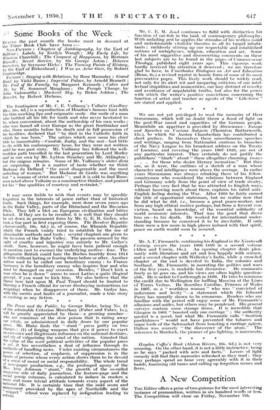We are not yet privileged to read the memoirs of
Herr Stresemann, which will no doubt throw a flood of light on the post-War mood and capacities of the German people. Meanwhile an appetiser is provided by Stresemann : Essays and Speeches on Various Subjects (Thornton Butterworth, 15s.), to which Sir Austen Chamberlain has contributed a short preface. In themselves these miscellaneous speeches and writings, ranging from Nationalist orations to branches of the Navy League to his broadcast address on the Treaty of Locamo, and covering the years 1907-1926, are not of any particular interest. They certainly do not justify the publishers' "blurb" about " these altogether charming essays . . . for those who desire literary recreation." But they are, as it were, the outlines of a sketch of a man whose character and intelligence were above the average. In earlier years Stresemann was always rebuking those of his fellow- countrymen who considered the relations between England and Germany solely from the point of view of trade rivalry. Perhaps the very fact that he was attracted to English ways, without knowing much about them, explains his rabid anti- English feeling during the War. After 1918 he fairly earned the title of opportunist statesman, but we realize now that he did what he did, i.e., became a great peace-worker, not from any high ethical motive perhaps, but from a fervent con- viction, based on knowledge, of the essential solidarity of world economic interests. That was the goad that drove him on—to his death. He worked for international under- standing because lie conceived it to be inevitable. If only there were a few more in high places imbued with that spirit, peace on earth would soon be assured.










































 Previous page
Previous page